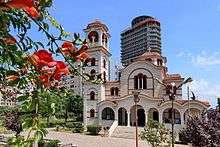Astius
Astius (died AD 117; Albanian: Asti) is a 2nd-century Christian martyr venerated by the Roman Catholic and Eastern Orthodox churches. He was the bishop of Dyrrhachium (now Durrës in Albania). According to legend, he was arrested by Agricola, the Roman governor of Dyrrachium, and was tortured to death around 98 AD for refusing to worship the god Dionysius. He was crucified during the persecution of Christians under the Roman emperor Trajan.
Saint Astius | |
|---|---|
| Martyr and Bishop of Dyrrhachium | |
| Died | c. 98 Dyrrhachium |
| Venerated in | Roman Catholic Church and Eastern Orthodox Church |
| Feast | 4 July – Eastern Orthodox Albanians celebrate on July 6 |
| Patronage | city of Durrës |
Life
The hieromartyr Astius was born an Illyrian. Astius was bishop of the city of Durrës (Dyrrachium), during the time of the emperor Trajan (98–117). The saint once had a dream, a foreboding of his impending suffering and death for Christ. He was arrested by the Roman governor of Durrës, Agricola, around the year 98.[1] He was beaten with leaden rods and oxhide whips, but St Astius did not renounce Christ. They smeared his body with honey, so as to increase his suffering with the stings of hornets and flies, and crucified him for refusing to worship Dionysus. The martyr’s body was reverently buried by Christians. His feast day is July 4.[2] In Albania, he is commemorated on July 6.[3]
During this period, many Christians fled to Albania to escape persecution in Italy. Among them were the seven holy martyrs: Peregrinus, Lucian, Pompeius, Hesychius, Papius, Saturninus and Germanus. Witnessing the martyrdom of Bishop Astius, who was crucified by the Romans, they openly praised the courage and firmness of the holy confessor. Because of this, they were seized, and as confessors of faith in Christ, they were arrested, thrown into chains, and subsequently drowned in the Adriatic Sea.[4] Their bodies, carried to shore by the waves, were hidden in the sand by Christians. The martyrs appeared to the Bishop of Alexandria ninety years later, ordering him to bury their bodies and to build a church over them. Their feast day is 7 July.[5]

St. Astius was declared patron protector of the city of Durrës.
References
- Elsie, Robert. A Dictionary of Albanian Religion, Mythology, and Folk Culture, NYU Press, 2001, p. 15ISBN 9780814722145
- "Hieromartyr Astius the Bishop of Dyrrachium in ", Orthodox Church in America
- https://www.scribd.com/doc/139765547/Kalendari-Orthodhoks-2013 Archived 2013-10-22 at the Wayback Machine This is the day the Divine Liturgy is served in his memory at the church named for him,the cathedral in Durres.
- Elsie, Robert. "The Christian Saints of Albania", Balkanistica 13, p. 36, 2000
- "Martyr Peregrinus of Dyrrachium in Macedonia", Orthodox Church in America